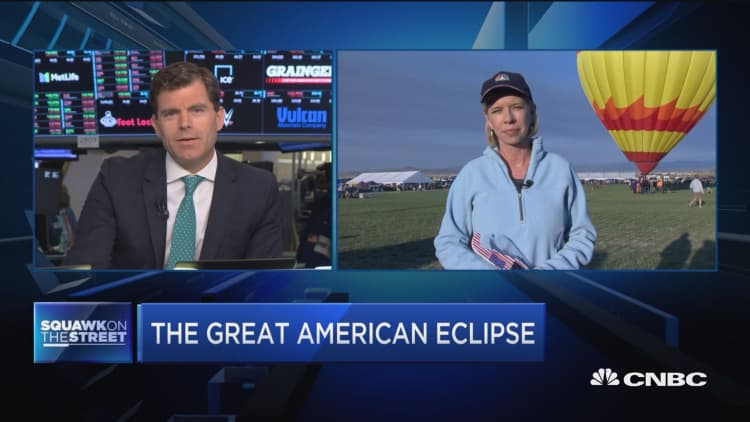Some companies hope to get a business boost from the millions of people traveling to see Monday's once-in-a-century solar eclipse.
Using FactSet to look at earnings call transcripts from the last month for mentions of "solar eclipse," CNBC found that executives of the following stocks expect some benefit:
For car rental company Avis Budget, CEO and COO Larry D. De Shon said the eclipse was pushing rental prices higher.
"We have kind of a strange event this year," Shon said on the Aug. 8 earnings conference call. "We're just driving higher pricing in one specific week in the week of August and that's all around the solar eclipse, and those markets were driving quite a bit of rental activity that week. And so the pricing is very strong in that week."
Community bank First Interstate BancSystem has more than 120 offices in Idaho, Montana, Oregon, South Dakota, Wyoming and Washington state, some of the key places where viewers are experiencing the total solar eclipse.
"There is an economic windfall on the horizon, as Oregon, Idaho and Wyoming prepare to be in the direct path of a total solar eclipse in August that is estimated to attract somewhere around 1 million visitors to these three states," CEO and President Kevin Riley said on the July 27 earnings conference call.
"People from around the world are expected to travel here to see the event. In addition, we are hearing bookings at local airports for private jets are at maximum capacity," Riley said.

Solar power company Sunrun's chief executive officer and co-founder, Lynn Michelle Jurich, also mentioned the eclipse during the company's Aug. 7 conference call as a way to highlight the importance of solar energy.
"The solar eclipse highlights just how bright the future will be," she said. "The sun is one of the most reliable and predictable energy sources in the world. Just think about it, at any given place on Earth, the sun on average takes a break once every 300 years to 400 years, and we know about it well in advance."
The U.S. Energy Information Administration expects the eclipse to block at least 70 percent of sunlight over the power plants that produce nearly half of the country's major solar power capacity.
The eclipse will block 90 percent or more of sunlight over North Carolina, and Charlotte-based Duke Energy said the state's solar power capacity will fall to 200 megawatts from 2,500 megawatts in 90 minutes. As a result, North Carolina has natural gas-fired plants ready to provide power, according to Duke.
traded 2.5 percent higher Monday morning, tracking for their best day since Aug. 10 and on pace for their first positive month since April.
Big hotel chains like Marriott International and Hilton offered eclipse travelers special packages, and InterContinental Hotels said in late July that two of its three Nashville, Tennessee, hotels were sold out.
To be sure, benefits to business are likely limited. Only 14 U.S. states will experience total darkness during the two-minutes or more of the total solar eclipse, according to NASA.
Of 28 hotels under the Pebblebrook Hotel Trust, just five fall into the prime solar eclipse viewing areas of Portland, Oregon, and Nashville.
Those two markets are "pretty much sold out" for the few days around the eclipse, Jon Bortz, chairman, president and CEO of Pebblebrook, said on a July 28 conference call.
But "overall it's unfortunately not big enough," he said. "If the eclipse lasted for more than like a minute and a half or two and a half minutes, [if] it lasted maybe three or four days, that might not be good for economy but it would help our hotels."
— CNBC's Tom DiChristopher contributed to this report.


